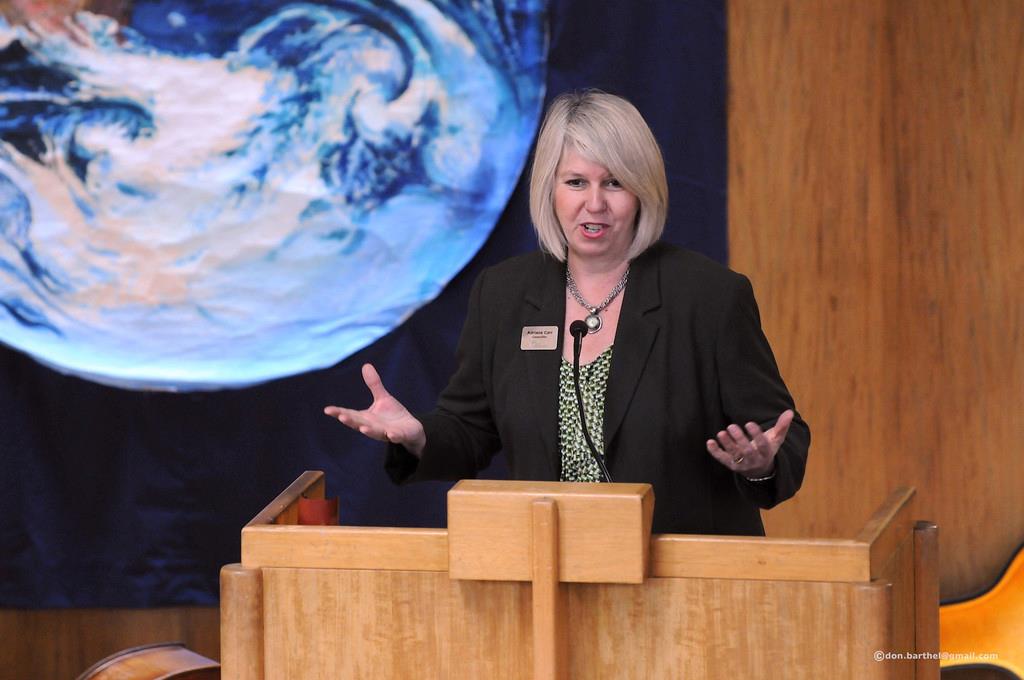A new poll shows Green Councillor Adriane Carr extending her lead as top choice for Mayor of Vancouver.

The poll, the second in a series by Resarch Co., also found a high level of interest in the coming election with nearly half of respondents saying they are more enthusiastic about the coming vote than they have been in past years.
The survey found 35 per cent of respondents said Carr would be a “good choice” for mayor, up nine points from a previous poll in April.
The two-term councillor has said she is interested in running, but has not declared. She is courting support from Vision Vancouver, COPE and One City Vancouver, none of whom have yet agreed to back her.
WATCH: Could Vancouver soon have its first female mayor?

“It’s definitely better numbers than what we see from the other contenders that have been mentioned in this race, particularly those that would represent the Non-Partisan Association (NPA),” said Research Co. president Mario Canseco.
“Weeks keep going by, and she definitely seems to be connecting more with voters.”

Get daily National news
Four other candidates earned double digit support in the poll.
Vision Vancouver councillor Raymond Louie pulled 19 per cent support, independent Jean Swanson earned 17 per cent support, Non-Partisan Association (NPA) councillor Hector Bremner took 11 per cent support and NDP MP Kennedy Stewart saw 10 per cent support.
Of those four, only Bremner has officially declared intentions to seek the mayor’s job.
On the flip side, 22 per cent felt Louie would be a “bad choice,” while 16 per cent felt that way about Bremner and 13 per cent about Carr.
Among other declared candidates, the NPA’s John Coupar had the support of nine per cent, independent Shauna Sylvester took seven per cent, and the NPA’s Glen Chernen and former Conservative MP Wai Young both took six per cent.
However, Canseco said those numbers could shift once the NPA — which is supported by about a third of voters — officially selects its candidate on May 31.
“It’s a tough one at this stage because it’s almost like asking about primaries in the United States. You will have roughtly 10, 11, 17 per cent of voters saying they like one of the candidates. Once they settle on the candidate it will be a lot easier.”
WATCH: Wide open field for Vancouver mayor’s job

Unity candidate?
Half of respondents to the poll say they want to see a single mayoral candidate supported by Vision Vancouver, the Greens, One City and the Coalition of Progressive Electors (COPE). About one in four people don’t.
Women (54 per cent), East Vancouver residents (54 per cent) and people older than 55 (52 per cent) were most likely to back the idea, as were 2014 voters for Vision’s Gregor Robertson and COPE’s Meena Wong (64 per cent and 62 per cent respectively.)
People who voted for the NPA’s Kirk LaPointe last election were most likely to reject the idea (65 per cent).
READ MORE: Gregor Robertson’s political peers weigh in on his legacy, as 3-term mayor bows out
Council makeover?
Respondents were divided over what they’d like to see Vancouver’s new city council look like.
One third said they’d like to see the NPA take control of the mayor’s office and council, while the same number disagreed and a third were unsure. Men (44 per cent), high earners (42 per cent) and homeowners (41 per cent) were most likely to support the idea.
Meanwhile, nearly half of respondents (47 per cent) said they planned to pick candidates on a case-by-case basis, rather than by party affiliation. Just under 40 per cent said they’d vote based on a party slate.
Unsuprisingly, the poll found housing (42 per cent) and the cost of living (36 per cent) to be the top issues by a large margin. Poverty (five per cent) and government accountability (four per cent) were the next closest issues.
The poll was conducted from April 28 to 30 from a sample of 400 adults in the City of Vancouver, and has a margin of error of +/- 4.9 per cent.
-With files from Gord MacDonald












Comments